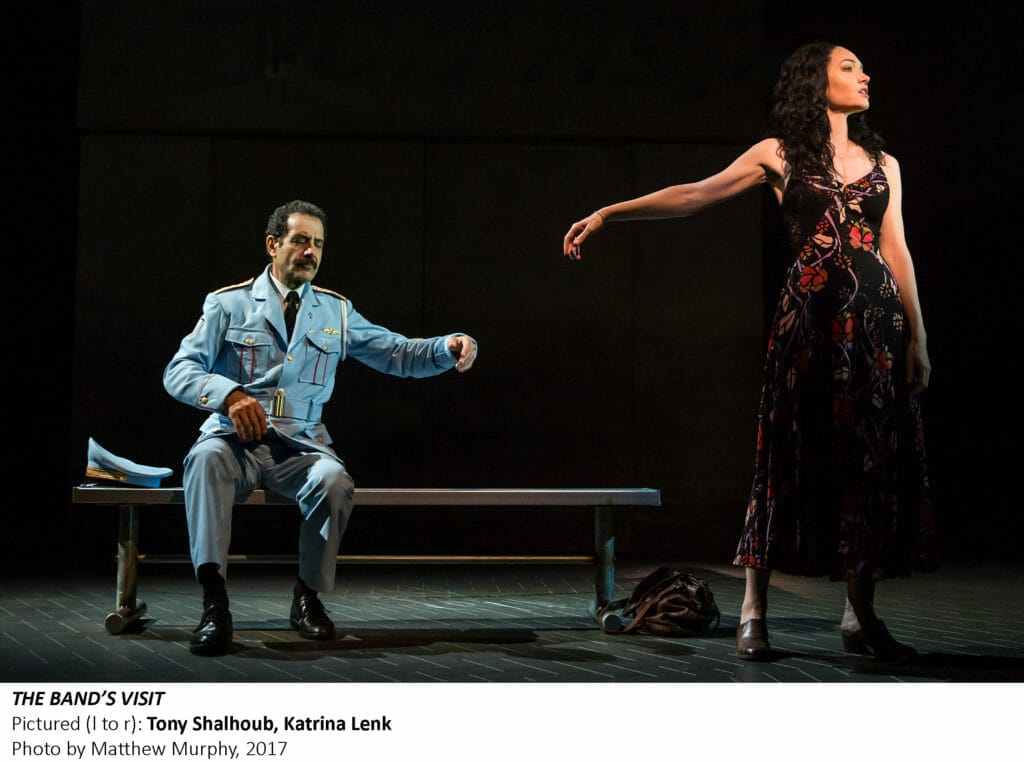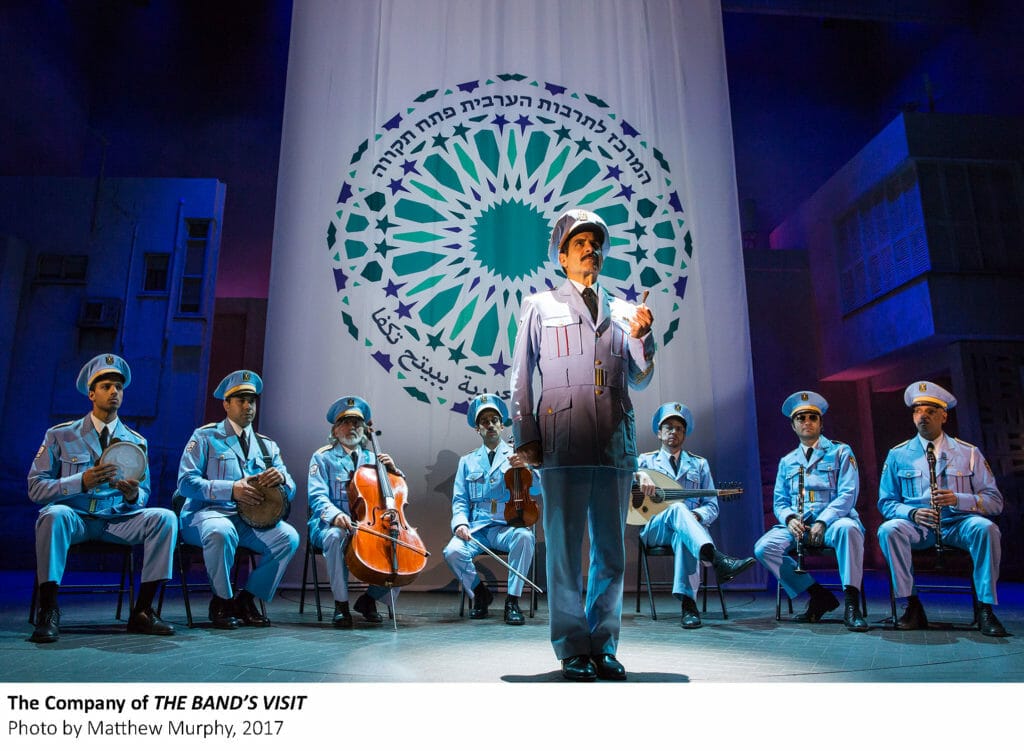“Once not long ago a group of musicians came to Israel from Egypt. You probably didn’t hear about it. It wasn’t very important.”
That line is projected on the curtain at the beginning of THE BAND’S VISIT and of course you know it isn’t true. Why else would we all be there? The visit may not have had geopolitical significance, but to the 20 or so people involved in this story, it became life-altering.
The band in question is the Alexandria Ceremonial Police Band from Alexandria, Egypt. They land at an airport in Israel and are scheduled to travel by bus to a concert at an Arab Cultural Center in Petah Tikva (a city of 225,000 near Tel Aviv), but their chartered bus doesn’t arrive. When they inquire about taking a regularly scheduled public bus to their destination, they inadvertently take a bus to Bet Hatikva - a very small (and fictitious) town in the desert. (Say “Petah Tikva” and “Bet Hatikva” aloud and you’ll get the aural similarity). They get off the bus in Bet Hatikva, at the only café in town, and soon realize they’re in the wrong place. (“No cultural center here – no culture, either,” they’re told).
By now the bus has left and there won’t be another until the next day. As they’re stuck in Bet Hatikva for the night, Dina (Katrina Lenk), the proprietress of the café, offers along with other residents to put the eight musicians up for the night. They split up into groups – some staying with Dina, some with the young couple Itzik and Iris (John Cariani and Kristin Sieh), and some will sleep in the café.
Stuck in a small desert town
“Stuck” is the operative word for the villagers as well as for the visiting musicians. If the villagers aren’t exactly stuck in Bet Hatikva – which they introduce to the musicians in the musical number “Welcome to Nowhere” – they’re stuck in their lives in many ways.
We get to know the villagers and the musicians as the action alternates between the various hosts and host groups, through dinner and what passes for nightlife in Bet Hatikva. Without a common language, the Israelis and the Egyptians converse in broken English and their stories are gradually revealed.
Band leader Tewfiq (Tony Shaloub) and the flirtatious trumpeter Haled (Ari’el Stachel) stay with Dina. Tewfig, a formal, almost rigid man in keeping with his position as policeman and band leader, is divorced and suffering from grief. Dina is divorced as well, with an ex-husband they can’t avoid in this tiny hamlet. Dina’s young employee Papi (Etai Benson) is terminally shy around women – the opposite problem shown by the aggressive Haled.
The group staying with Itzik and Julia are exposed to the rift in that couple’s marriage (she’s frustrated that he can’t keep a job and seems to be directionless) and Itzak’s father wistfully recalls his late wife. Then there’s “telephone guy” (Adam Kantor) – a young man who waits besides the public pay phone (the story is set in 1996, when there still were such things) night after night, expecting a call from his girlfriend.
The stories are revealed slowly and gently. No one moves very fast in Bet Hatikva – where is there to go after all? Director David Cromer (a Chicagoan directing his first Broadway musical) gives the action a leisurely pace and an energy that’s unlike that of the typical Broadway musical. Characters speak haltingly in their broken English – and carefully when conversing with the strangers. We can almost feel the heat of a summer’s day and night in this desert town that might cause its inhabitants to move so lethargically.
THE BAND’S VISIT quietly subverts conventions of Broadway musicals
Those looking for a traditional Broadway musical might be surprised. THE BAND’S VISIT is not big, flashy or fast-paced, but a quiet, sensitive and subtly played show that gradually draws the audience into its characters. These opposite camps of visitors and hosts – different not only because they are Arabs and Jews, but also because they are big city versus small town people – find their common humanity. The performances are all played quite subtly and in this writer’s opinion, quite award-worthy. The conductor Tewfig is highly reserved, says very little with words, but Tony Shaloub (known for TV’s MONK) communicates his character’s loneliness and desire to be a good person simply with body language. Katrina Lenk’s Dina, who invites Tewfig into her home, has dry wit and a hard exterior, but reveals her sensitivity underneath and her desire to move beyond her current rut as a nearly middle-aged divorced woman without prospects in this rural desert town. Etai Benson is both comic and lovable as the shy Papi and Ari’el Stachel reveals depth in the flirtatious Haled when he coaches Papi in the ways of wooing women.
The songs by David Yazbek, whose previous musicals include the brassier scores for THE FULL MONTY, DIRTY ROTTEN SCOUNDRELS and WOMEN ON THE VERGE OF A NERVOUS BREAKDOWN, have a middle Eastern flair, yet are melodic and accessible. Gentler and quieter than those of his earlier musicals, his lyrics here display the same wit he’s shown in previous outings, particularly in songs like “Welcome to Nowhere,” introducing the bandsmen and the audience to sleepy Bet Hativka. Itamar Moses’ book follows closely the screenplay of the 2007 Israeli film on which it is based. Together with director Cromer and scenic designer Scott Pask, whose sets include moving white clay walls that morph seamlessly into various locations within the town, to deliver a smoothly cinematic way of telling the story.
Broadway in New York pick for lovers of thoughtful entertainment and songs both funny and touching
THE BAND’S VISIT, in this writer’s opinion, has a greater resemblance to the sort of low-budget but rich and confident story telling of a good independent film than to a traditional Broadway musical. The closest thing to a big production number in the show, is a scene on skates (the choreography is by Patrick McCollum) at the local roller rink. The accompanying orchestra is just eight players – four of whom appear in costume on stage and actually play, supplemented by the other four players heard from offstage. In perhaps THE BAND’S VISIT’s greatest departure from a traditional Broadway musical, the true finale (not counting an epilogue in which the band finally performs its concert in the correct city) is a ballad rather than a more typical upbeat anthem. The Telephone Guy leads off the hauntingly beautiful song “Answer Me” as he’s staring into the pay phone, and gradually the rest of the characters join in this lovely number communicating their common need for love or at least connection.
THE BAND’S VISIT is one of the two big hits of the current Broadway season. It’s selling out, but seats should be available with a little advance planning.
When:
Now playing - open-ended run
Tuesday – Thursday at 7pm
Friday & Saturday at 8pm
Matinees at 2pm on Wednesday & Saturday; Sunday at 3pm.
Where:
Tickets:
Photos: Matthew Murphy
Click here for more Picture this Post Broadway in New York Reviews and Previews.
About the Author:
John Olson is an arts carnivore who is particularly a love of music, theatre and film. He studied piano, trombone and string bass into his college years, performing in bands and orchestras in high school and college, at the University of Wisconsin-Madison. While working as an advertising agency account manager, he began a second career as an arts journalist and is now principal of John Olson Communications, a marketing and public relations business serving arts and entertainment clients.








